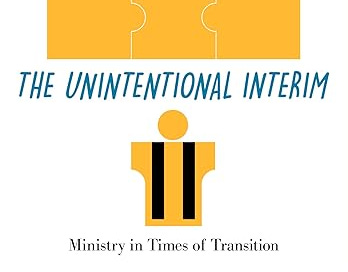Book recommendation: The Unintentional Interim
Don't let the title fool you. This book is for all congregational clergy.
At the end of my first congregational ministry position, the chair of the deacons told me that I had been a great unintentional interim minister for the church. (I had followed a long-time associate pastor who was somewhat controversial and had fuzzy boundaries.) This deacon chair meant his comment as a compliment, but I could only hear the “unintentional interim” bit. I felt shame for a long time about serving in that role for a shorter time than I had planned. I eventually integrated my unintentional interim ministry stint into my evolving call to ministry, which prompted me to train for interim ministry and coaching. That deacon chair’s observation set me on a trajectory for which I am now grateful.
Given the importance of unintentional interim ministry in my own vocation, I was excited to read Jeffrey A. Nelson’s book The Unintentional Interim: Ministry in Times of Transition from the first time I saw it advertised.
In the book Nelson talks about how our culture and society are changing rapidly, which means that churches are facing more frequent transitions as well. What has really been true all along, then, is becoming even more apparent: all ministers are interim ministers.
I understand if this sounds scary to clergy and congregations. When a pastor search is completed, everyone involved wants to believe that an indefinite period of fruitful mutual ministry lies ahead. The truth is, though, that there comes a point at which a minister’s journey begins to diverge from the church’s. When this happens sooner than expected, the pastor may have to consider the possibility that they are an unintentional interim minister.
What this usually means, Nelson explains, is that there is something that has remained unresolved in the congregation’s story, dynamics, or functioning from before the unintentional interim minister’s arrival. The unintentional interim is called upon, then, to help the church work through those issues so that a future leader can have a more settled tenure.
(It’s important to note that there is a role called intentional interim ministry. The “intentional” doesn’t just mean “on purpose.” Intentional interims have been trained to go into congregations during pastoral transitions and help the people there reflect on who they have been, are, and are being called to be.)
Nelson notes that it is possible for a minister to succeed themselves, which I thought was a particularly useful insight. So even when a pastor is an unintentional interim, it is possible for them to have a longer tenure. Once the clergyperson and congregation work through residual issues, both parties can discern whether to re-covenant, acknowledging a new chapter in their shared story, or part ways.
With all of the changes prompted by outside forces over the past several years, these hard, holy choices are becoming increasingly frequent. Nelson says that a pastor’s decision might rest on whether they are experiencing exhaustion (which can be remedied by rest and alterations to routine) or burnout (which requires more sweeping measures like leaving a position or even congregational ministry altogether).
Whether ministers are facing big decisions or simply dealing with some turbulence in congregational life, Nelson’s book can be a help to them in evaluating their situations, building more robust self-care plans, and (re-)connecting to people who can assist with work or remind clergy of who they are as humans. In addition to the content, each chapter ends with breath prayers and reflection prompts to tap into Spirit and allow readers to apply the material.
In short, I commend this book to pastors, whether they are short-timers or long-timers, interims on purpose or not. It can reassure all ministers that their length of time in the role does not have to be a cause for shame and that positive impact is possible - even if its fruit does not emerge until much later - in even the briefest of stints.






This was already on my TBR list but this is even more true after reading this review. I trust Jeff brings tremendous insight from his work assisting Committees on Ministry in the United Church of Christ. (These are the bodies in our tradition where church problems and quirks are sorted out as related to clergy and the people within the congregation. I know there are parallels in other traditions but I can't think of them right now! Anyhow, he's seen a lot being in this role through the tail end of the pandemic.)